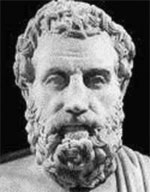More People of Greece
More Topic Categories
Related Destinations
Sophocles (496 BC - 406 BC)

Sophocles was one of the three major tragedian poets of Ancient Greece, whose some of their works have survived to our days.
He was born in Athens, son of a wealthy Athenian who had a knife factory. Because of his father’s wealth, Sophocles received proper education. When he was 15 years old, he was the leader of the chorus during the ceremony dedicated to the victory during the Battle of Salamis. He formed close bonds with various political and intellectual figures of his time, such as Pericles, Socrates and Plato, and he managed to be placed in high offices in politics, religion and art.
During the years 443 – 442 BC, he was the treasurer of the Athenian Naval Coalition. In the following two years, along with Pericles, he led the fleet in the attack against Samos, which resulted in the slaughtering of all men of the island. In 428, he became a general alongside Thucydides, and in 413, he was a member of the oligarchic government of Athens. Sophocles was the person that introduced to Athens the worship of Asclepius; for this reason, he was declared “Hero Philathenian” after his death.
His first appearance in theatre was in 468 BC at a drama contest, during which he competed against his 30 – years – older Aeschylus, whom Sophocles honoured and respected. In fact, he emerged victorious. In various contests, he staged over 30 tetralogies, winning 20 first places and never taking the third place. However, it should be noted that Sophocles was particularly loved among Athenians, because of his political and religious activities, as opposed to his friend, Euripides, who lived a rather secluded life and was quite disliked. Sophocles wrote a total of 123 tragedies, but only 114 are known; 7 of them have been saved to their fullness, including Antigone and Electra. His other surviving works are Tracheneae, Oedipus the Tyrant, Aeas, Filoctetes, and Oedipus in Colonos. The main theme in Sophocles’ tragedies is the common man that comes in direct, dramatic and unavoidable conflict with the gods. Although a very religious person himself, something that is evident in his works, Sophocles is particularly interested in showing the actions of men in contrast to the actions of gods. However, the destiny of men is unavoidable and predetermined by the volition of the gods, which is no longer depicted as random and arbitrary as it was in previous tragedians, but carefully planned and intentional. A papyrus has also been saved, which contains a large excerpt of the satirical drama Ichneutai, reciting the stealing of Apollo’s oxen by Hermes.
See Also:
 Athens Photos
Athens Photos
 Santorini Photos
Santorini Photos
 Crete Photos
Crete Photos
 Meteora Photos
Meteora Photos
 Corfu Photos
Corfu Photos


